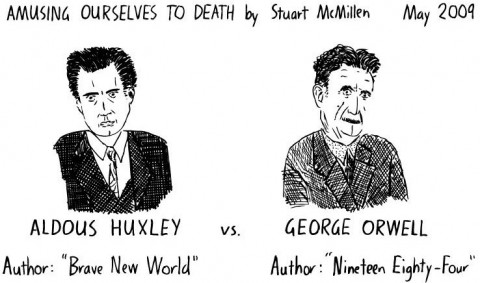P J O’Rourke talks Swift, Huxley, Orwell and Waugh and says we now live in the world of 1984 but, instead of being a horror show, a television that looks back at you is just a pain in the ass. It’s 1984-Lite. Sad in one way, but a relief in another.
The category of political satire books is simply closed. The top five are so good that in order to make any surprising choices one has to go a long way down to the next level.
[. . .]
I’ll be careful. Animal Farm and 1984.
Yes. One is comic satire and the other is tragicomic satire.
Let’s start with the comic.
Well, Animal Farm sticks in everybody’s mind. All animals are equal but some animals are more equal than others. Again, something read twice. I read it for the first time when I was 14 or 15 and it was a funny story about badly behaved animals and then I read it again at college and someone pointed out to me that this was sharp social satire. I thought it was an animal story, a kids’ book, but when I took another look at it I realised what he was getting at. The Soviet leadership was pretty well represented there. But one of the things that’s interesting to me about both Animal Farm and 1984 is that they are warnings against collectivism from a man of the left. Sure, any old Tory or Republican might be likely to make this point, though not so well, perhaps, nor so amusingly, but the fact that it comes from a man of the left is interesting. It seems to me to be something Orwell never fully came to grips with. Maybe if he’d lived longer…
What do you mean?
The necessity for collectivism under his leftist ideals and yet the danger of collectivism no matter who it’s done by seems like something he really wrestled with. I think we all buy the necessity for collectivism in a way.
[. . .]
Have you actually been to Sweden? I’ve never been, but I find myself constantly holding it up as the pinnacle of socialist marvellousness. It could be a complete shit-hole for all I know.
I have been and you know what it is? It’s very foreign. It’s full of Swedes. I mean, there are a few immigrants, and it has more now than it did 15 years ago when I was there, but Swedes are really Swedish. They are just remarkably alike. So, when you have a country of only eight and a half million people and they’re very like each other and you take 80 per cent of their income away and redistribute it through political means and they go: ‘Ya, ya, dat’s vot I vonted! Abba records! Herring and a PhD!’ And it’s all okey-dokey. But if you take a country as diverse as the United States and you take everything away from everybody and redistribute it — oh my God, there’d be hell to pay! I mean, some people would want guns, and some people… I wouldn’t even want to ask what some people would want.
[. . .]
1984.
That’s satire more in the Roman mode. The usual definition of satire is humour used to a moral end for a moral purpose, and there’s certainly a moral purpose to 1984 but it’s not funny really. I mean there is a certain dark humour to rewriting history and things going down a memory hole.
It’s funny in the Russian sense of the word.
I like that. Believe me, I’ll steal that phrase.
I’ll see you in court.
It’s sort of like being popular in Japan.




